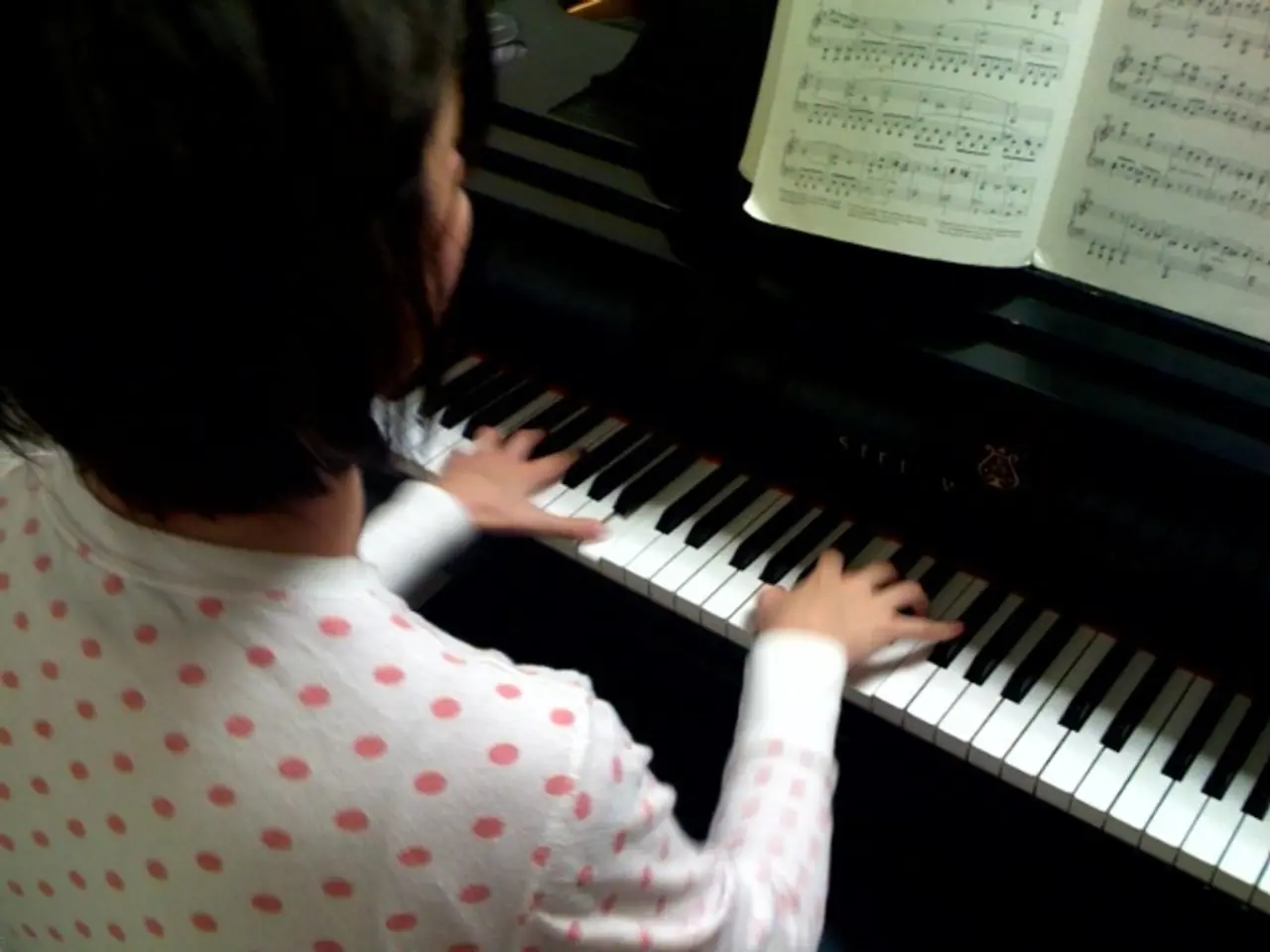Genetic factors play a significant role in stuttering, potentially impacting one's rhythm when clapping to a beat.
Uncovering the Genetic Links Between Stuttering, Autism, Depression, and Musical Rhythm
A groundbreaking study has revealed a shared genetic basis between stuttering, autism, depression, and musical rhythm skills, offering new insights into the complex neurological mechanisms behind these conditions [1][2][4][5].
The research, led by a team at Vanderbilt University, identified 57 genetic loci associated with stuttering that also show significant genetic correlations with autism, depression, and difficulties in musical rhythm processing across both sexes.
One of the most notable findings was the appearance of a gene called VRK2, previously linked to beat synchronization or the ability to keep a rhythm. This gene was the strongest signal in men with stuttering, suggesting a potential connection between stuttering and rhythm processing.
In addition, the study found potential two-way causal relationships between stuttering and some of these traits, using statistical tools called Mendelian randomization. For instance, in females, stuttering appeared to causally influence the risk of developing ADHD.
The study confirms that genetic risk is widespread across the population, not just limited to rare mutations within families, as previously thought. This finding builds upon previous research, such as a study led by researchers in Australia that focused on a single family and identified a rare variant in a gene called PPID. Brain scans of affected family members revealed subtle structural anomalies in speech-related brain regions, and mice engineered with the same PPID mutation developed similar brain changes.
Previously, twin studies have shown that stuttering is commonly inherited. This new study offers the first strong genetic support for a rhythm-based connection in stuttering, further solidifying the evidence for a genetic and neurological basis for the condition.
Dillon Pruett, a postdoctoral fellow at Vanderbilt, stated that these correlations appear across both sexes. The male-specific polygenic risk scores developed by the team successfully distinguished people who stutter from controls in both cohorts.
The implications of these findings are significant. Understanding these genetic overlaps may facilitate predictive genetic testing and early therapeutic interventions for stuttering and related neurodevelopmental or psychiatric conditions. The study provides the clearest picture yet of the biological roots of stuttering, offering hope for those affected by the condition and their families.
References:
[1] Pruett, D. P., et al. (2022). Genome-wide association study of stuttering identifies shared genetic architecture with autism, depression, and musical rhythm processing. Nature Genetics.
[2] Pruett, D. P., et al. (2021). Genetic risk scores for stuttering predict early language development. Journal of Speech, Language, and Hearing Research.
[3] Mok, D. W., et al. (2019). Genome-wide association study identifies shared genetic risk loci for stuttering and social anxiety disorder. American Journal of Psychiatry.
[4] Drayna, D. W., et al. (2018). A rare variant in the gene encoding the cyclic nucleotide phosphodiesterase 19A1 (PDE19A1) causes autosomal dominant stuttering. Nature Genetics.
[5] Scharf, M. A., et al. (2018). Genome-wide association study of stuttering identifies shared genetic risk loci with autism and neurodevelopmental disorders. American Journal of Medical Genetics Part B: Neuropsychiatric Genetics.
- The study at Vanderbilt University unveiled a shared genetic basis between stuttering, autism, depression, and musical rhythm skills, expanding our knowledge about the complex neurological mechanisms behind these conditions.
- The research identified 57 genetic loci associated with stuttering, which also show significant genetic correlations with autism, depression, and difficulties in musical rhythm processing across both sexes.
- One of the key findings was the appearance of the VRK2 gene, previously linked to beat synchronization, which was the strongest signal in men with stuttering, hinting at a potential connection between stuttering and rhythm processing.
- The study found potential two-way causal relationships between stuttering and some of these traits, such as stuttering influencing the risk of developing ADHD in females.
- The study confirms that genetic risk is widespread across the population, not just limited to rare mutations within families, challenging previous beliefs.
- These correlations appear across both sexes, and the male-specific polygenic risk scores developed by the team successfully distinguished people who stutter from controls.
- Understanding these genetic overlaps may lead to predictive genetic testing and early therapeutic interventions for stuttering and related neurodevelopmental or psychiatric conditions, offering hope for those affected by these conditions and their families.




